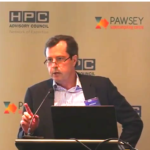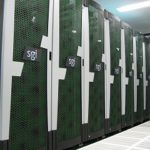http://orionx.net/wp-content/uploads/2022/04/021@HPCpodcas_Storage-with-Gary-Grider_20220420.mp3 Shahin and I are in violent agreement: if you’re interested in high performance storage, if major milestone in the development of HPC storage technology over the last 30-plus years interests you, if you want a peek at future forward leaps in HPC storage technology, then this is an @HPCpodcast episode for you. Our special […]
@HPCpodcast: HPC Storage Rock Star Gary Grider Talks How We Got Here and Where We’re Going
Atos steps up with NVMeOF Flash Accelerator Solutions
Atos recently announced two new flash accelerators for HPC) workloads as part of Atos Smart Data Management Suite. These two new solutions – Smart Burst Buffer (SBB) and Smart Bunch of Flash (SBF) – increase the performance and productivity of HPC I/O intensive applications. They are the most flexible and cost-effective flash accelerators on the […]
Introducing the Cambridge Data Accelerator
In this video from the Dell EMC HPC Community meeting, Alisdair King from Cambridge University describes the new Cambridge Data Accelerator. “The Cambridge Data Accelerator is an open source software package for building Burst Buffers from high speed flash storage. With available support from Cambridge University, the Cambridge Data Accelerator offers flexibility and high performance for high performance workloads.”
BioBurst: Leveraging Burst Buffer Technology for Campus Research Computing
In this video from the DDN User Group at SC17, Ron Hawkins from the San Diego Supercomputer Center presents: BioBurst — Leveraging Burst Buffer Technology for Campus Research Computing. Under an NSF award, SDSC will implement a separately scheduled partition of TSCC with technology designed to address key areas of bioinformatics computing including genomics, transcriptomics, […]
Infinite Memory Engine: HPC in the FLASH Era
In this RichReport slidecast, James Coomer from DDN presents an overview of the Infinite Memory Engine IME. “IME is a scale-out, flash-native, software-defined, storage cache that streamlines the data path for application IO. IME interfaces directly to applications and secures IO via a data path that eliminates file system bottlenecks. With IME, architects can realize true flash-cache economics with a storage architecture that separates capacity from performance.”
Video: DDN Burst Buffer
Justin Glen and Daniel Richards from DDN presented this talk at the HPC Advisory Council Australia Conference. “Burst Buffer was originally created to checkpoint-restart applications and has evolved to help accelerate applications & file systems and make HPC clusters more predictable. This presentation explores regional use cases, recommendations on burst buffer sizing and investment and where it is best positioned in a HPC workflow.”
HPC Trends Survey from DDN Reveals Rising Deployment of Flash Tiers & Private/Hybrid Clouds
“The results of DDN’s annual HPC Trends Survey reflect very accurately what HPC end users tell us and what we are seeing in their data center infrastructures. The use of private and hybrid clouds continues to grow although most HPC organizations are not storing as large a percentage of their data in public clouds as they anticipated even a year ago. Performance remains the top challenge, especially when handling mixed I/O workloads and resolving I/O bottlenecks.”
DDN to Demonstrate Latest HPC Technology at SC16
Today DDN announced plans to showcase innovations in HPC leadership at SC16 in Salt Lake City. DDN will feature and demonstrate new advancements in flash for HPC, Lustre* parallel file system performance and security, and open and software-only object storage and burst buffer offerings.
University of Tokyo to Deploy IME14K Burst Buffer on Reedbush Supercomputer
Today DDN Japan announced that the University of Tokyo and the Joint Center for Advanced High Performance Computing (JCAHPC) has selected DDN’s burst buffer solution “IME14K” for their new Reedbush supercomputer. “Many problems in science and research today are located at the intersections of HPC and Big Data, and storage and I/O are increasingly important components of any large compute infrastructure.”
NERSC to Host Data Day on August 22
Today NERSC announced plans to host a new, data-centric event called Data Day. The main event will take place on August 22, followed by a half-day hackathon on August 23. The goal: to bring together researchers who use, or are interested in using, NERSC systems for data-intensive work.












